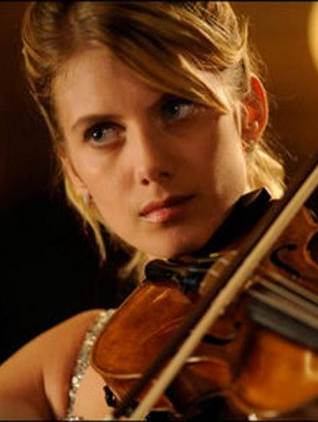Sylvain
Richard is a film critic at Arts & Opinion. He
gave The Concert, which played at the 2009
Cinemania Film Festival, 3.5 out of 4 stars.
For the rest of his ratings, click HERE.
Often,
during tumultuous or unstable periods of history, or living
under a dictatorship that severely restricts freedom or persecutes
a particular minority group, an individual, in order to survive,
may be required to take on a false identity. In a round about
way, this identity issue informs the latest film, The
Concert, by Romanian director Radi Mihaileanu.
 Radu
Mihaileaunu’s father, born Buchman, who along with other
Jews, had to take on a false identity in order to escape from
first the Nazis and then Stalin. The experience would mark
both the father and son.
Radu
Mihaileaunu’s father, born Buchman, who along with other
Jews, had to take on a false identity in order to escape from
first the Nazis and then Stalin. The experience would mark
both the father and son.
In
his Train of Life (1998), which Mihaileaunu scripted
and directed, the resident fool of his village devises a scheme
to engineer a false deportation train across the Russian border
so that the villagers can escape to Palestine. In Live
and Become, which won the prestigious Mel Hoppenheim
award at the 2005 Cinemania Film Festival, an Ethiopian Christian
boy is persuaded by his mother to pretend he is Jewish during
Operation
Moses -- conceived to save Ethiopian Jews from
famine- stricken Sudan – to survive and eventually enjoy
a better life.
His latest offering, The Concert, is an intelligent,
perfectly mixed blend of comedy and drama that is emotionally
satisfying on every level: the music featuring Tchaikovsky’s
violin concerto is nothing less than cathartic; top-notch
performances from a stellar cast that includes Alesksei Guskov,
Melanie Laurent, Francois Berleand and Miou Miou; and keeping
all the subplots from flying asunder is a sharp, incisive
script.
The
film sets out to address (correct) a past injustice. Thirty
years ago, during the Brezhnev era, Andrei Filipov, the legendary
prodigy conductor of the Bolshoi Orchestra, was fired and
publicly humiliated at the height of his glory for refusing
to get rid of the Jewish musicians in the orchestra, which
included his best friend Sacha. 
When
we first encounter Filipov, he is still at the Bolshoi but
working as a janitor. Now aged 50, he has sunk into booze
and depression. One day, late at night, he intercepts a fax
inviting the Bolshoi orchestra to perform at the prestigious
Théâtre Du Chatelet in Paris. Recognizing a golden
opportunity to get revenge, he embarks on a wild scheme to
round up all of his old musician buddies, most of whom are
working at menial jobs, and convinces them to pose as the
real orchestra. There are only two weeks to prepare, enough
time for all sorts of craziness to happen.
When
questioned why he employs humour to counter the injustices
of the past, he answers: “Because I am not a violent
person. Humour is the ultimate weapon I have against dictators
that have marked my life and the lives of my loved ones. I
use it to battle barbarism and death, to show that we are
stronger than they are, that we are still alive so we have
won.”
If
The Concert initially strikes the viewer as more
light hearted than his previous films, this is only an appearance
that refuses to give in to the darker currents that write
our history books. The implausible optimism of the film is
provided by the redemptive and healing qualities inherent
in music; we are treated to approximately 15 uninterrupted
minutes of Tchaikovsky’s magnificent Violin Concerto,
whose transcendental beauty is nothing less than a revelation
of man’s humanity.
Films
such as The Concert confirm the magical qualities
that inhere in cinema and productively engage the full range
of human emotions. This 120 minute film flew by and received
an ovation at the end. I, for one, am looking forward to Radu
Mihaileaunu’s next.